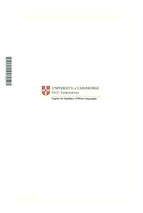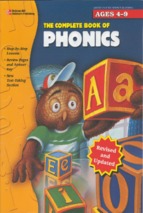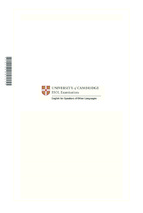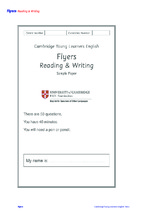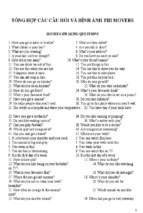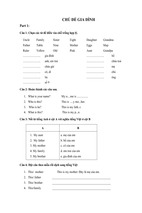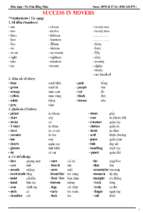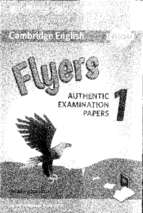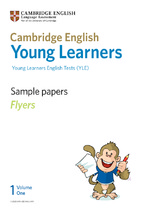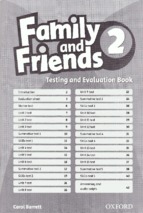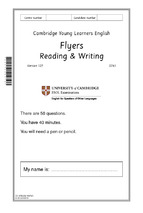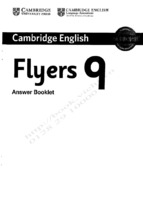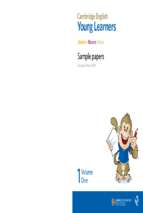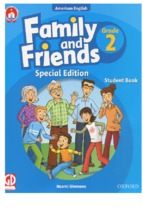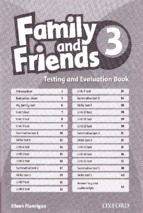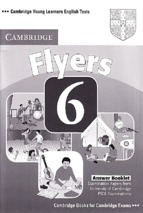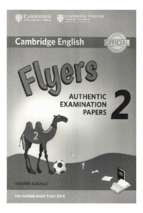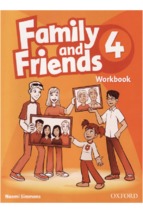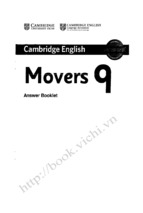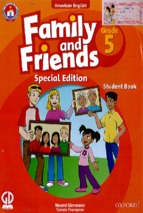new edition
r
Jennifer Seidl
Answer Book
With class audio CD and
photocopiable tests
OXFORD
UNIVERSITY PRESS
OXFORD
UNIVERSITY PRESS
Great Clarendon Street, Oxford OX2
6DP
Oxford University Press is a department ofthe University of Oxford.
It furthers the University's objective of excellence in research, scholarship,
and education by publishing worldwide in
Oxford New York
Aucldand Cape Town Oar es Salaam Hong Kong Karachi
Kuala Lumpur Madrid Melbourne Mexico City Nairobi
New Delhi Shanghai Taipei Toronto
With offices in
Argentina Austria Brazil Chile Czech Republic France Greece
Guatemala Hungary Italy Japan Poland Portugal Singapore
South Korea Switzerland Thailand Turkey Ukraine Vietnam
OXFORD and OXFORD ENGLISH are registered trade marks of
Oxford University Press in the UK and in certain other countries
© Oxford University Press 2005
The moral rights of the author have been asserted
Database right Oxford University Press (maker)
First published 2005
2009 2008 2007 2006 2005
10 9 8 7 6 5 4 3 2
All rights reserved. No part of this publication may be reproduced,
stored in a retrieval system, or transmitted, in any form or by any means,
without the prior permission in writing of Oxford University Press (with
the sole exception of photocopying carried out under the conditions stated
in the paragraph headed 'Photocopying'), or as expressly permitted by law, or
under terms agreed with the appropriate reprographics rights organization.
Enquiries concerning reproduction outside the scope of the above should
be sent to the ELT Rights Department, Oxford University Press, at the
address above
You must not circulate this book in any other binding or cover
and you must impose this same condition on any acquirer
Photocopying
The Publisher grants permission for the photocopying of those pages marked
'photocopiable' according to the following conditions. Individual purchasers
may make copies for their own use or for use by classes that they teach.
School purchasers may make copies for use by staff and students, but this
permission does not extend to additional schools or branches
Under no circumstances may any part of this book be photocopied for resale
:\ny websites referred to in this publication are in the public domain and
their addresses are provided by Oxford University Press for information only.
Ox.ford University Press disclaims any responsibility for the content
I SBN-13 : 978 0194309455
IS B N -13: 978 0194309424
IS BN'13: 978 01943094876
IS BN-1O: 0194309452
IS B N -1O: 0194309428
IS BN-IO: 0194309487
Printed in China
Answer Book
Class Audio CD
Answer Book and Audio CD pack
Answer Book
Class Audio CD
Answer Book and Audio CD pack
Introduction
Grammar Three is the third of a series of three
grammar books designed to make grammar clear,
interesting and easy to understand for young
learners. The books are designed to complement
any coursebook, and they cover the same basic
grammar syllabus as most beginner's courses. The
books can be worked through systematically, or
particular chapters can be selected and used as
needed. The Revision sections practise the grammar
covered in the preceding chapters.
Grammar Three is ideal for pre-teenagers and young
teenagers during their first few years of English
language study. It has a communicative, activitybased approach . Alongside the written exercises
(which can be completed in class or done as
homework), there are oral exercises as well as some
pairwork and a few puzzles and classroom games.
The material revolves around the daily life of an
English family, their friends, and an alien creature
called Trig. Trig is learning English. His role in the
book might be a comic one, but its function is
serious. His struggles, frustrations and triumphs are
a mirror of the pupils' own experience.
Each chapter begins with a short text or dialogue
which uses the target structure (or structures),
usually accompanied by an illustration to help
learners understand the situation. A 'Words to learn'
box highlights important or useful words which will
be used in the chapter. A 'Grammar lesson'
summarizes the grammar point, usually in the form
of a table or in a few simple sentences of
explanation accompanied by example sentences.
The exercises which follow provide practice of the
grammar and range from simple word insertion to
more challenging tasks requiring the writing of
sentences. There are some oral activities (most of
which can equally well be used as written exercises,
with pupils writing in their notebooks) and even a
few puzzles and games. The answers to the
exercises in Grammar Three are provided in this
Answer Book.
Note on the second edition
The second edition has been revised and updated to
ensure its continued relevance and appeal to young
learners all over the world. Although the structure
and content remains essentially the same, the
following changes have been made
• A few small extra grammar poi nts have been
added so that all the grammar required for the
Cambridge Young Learners Englis h Tescs is now
covered.
• Some of the vocabulary has been simplified and
there is extra help with vocabulary in the form of
the 'Words to learn' boxes and the Wordli st ac che
back of each Student's Book.
• New revision sections have been added. These
can be used to check pupils' progress, as pre-tes(
revision , or as additional material for mixed
ability classes.
• An audio CD supplied with the Answer Book
provides listening material for use with the
Student's Book in class. See the 'Notes for
teachers' on page 46 of this Answer Book for
more information.
Contents
page
Answers to Student's Book exercises
4
Tests
30
Answers to tests
40
Notes on listening material
42
Listening activities
43
You will also find five tests in this Answer Book,
each of which covers five chapters of the Student's
Book. The tests can be photocopied and used in
class. An answer key for the tests is included.
3
1 Are you running away?
1
Verb forms
b
Pupils' own answers. Follow examples.
c> YOU
Does Max watch game shows?
PARTNER
i
c>
h a
d
0
e
rn
i
)(
e
b e
g
i
n
u
r
i
e
q
h
r
i
I ~ I
a kl •
t
0
0
rn
q
f
2
h
c.. h
h a
p
p
e
r
g
e
t
0
S
3
4
e
Pupils' own answers.
4
Detectives
1
2
:llng
3
4
5
6
t
7
8
9
10
are riding
is stopp ing
are waving
is getting out
5
6
7
8
11
is shaking
is going into
are trying
is standing
3
Television
a
True.
False. She does n't watch TV for three or
four hours a day.
3 False. She doesn 't play th e piano .
4 True.
5 False. She doesn't do her homewor k in the
evenings.
6 False. She doesn't read the TV guide.
7 True.
8 False. He doesn 't hate cartoons.
9 False. She doesn't phone them when she
comes home from school.
10 False. He doesn't spend five hours a day
watching TV.
11
False. He doesn 't watch TV for an hour a
day.
12 True.
13 False. She doesn't like comedy shows.
14 True.
15 True.
4
PARTNER
What's happening?
1
2
1
2
YOU
No, he doesn 't.
Do Max and Sofia watch too much
television?
Yes, they do.
12
5
's doing OR is doing
's visiting OR is visiting
work
catch
's looking OR is looking
's trying OR is trying
's climbing OR is climbing
's doing OR is do ing
's goi ng OR is going
's carrying OR is carrying
's using OR is using
are you doing
Your plans
Pupils' own answers. Follow example.
c> Friday evening.
On Friday evening Fm going to the cinema.
2 Something awful happened
1
Verb square
3
A i X I 0 F TOO K M C s~1f'
VIC 0 M E(W V U P F A I U
2
3
4
5
'(\1'/0 R K)Q E G K NOW Z N
.
~ rcr
! G · P RAN L C Al M i E T H
Z
P U II K T I A K E'\!
~I U K S
:J
i
M N SEE) V S W T
two R KED L H L
lEITlw_il Q&G
infinitive
come
go
see
give
work
know
take
run
A V
6
I X N T
VQ E I
E0
7
8
9
WO
past simple
came
went
saw
gave
worked
knew
took
ran
The story of jeans
10
11
4
1
2
3
4
5
6
8
What were they doing?
1
2
3
4
5
6
7
8
Nick was singing.
Amanda and Anna were dancing.
Adam was playing the guitar.
Trig was sitting in the corner.
Tom and Paul were eating sandwiches.
Simon was looking at the COs.
Beth was drinking cola.
Emma and LUcy were playing cards.
9
10
5
12
13
14
15
16
17
18
19
20
21
22
was blowing
were wearing
had
used
was carrying
sewed
loved
didn ' t like
opened
imported
became
Where did he come from?
7
2
was
fell
didn't want
sent
lived OR
were living
were
taught
was taking
met
were looking
was raining
Where did his parents send him?
What did his brothers teach him?
When did he set out for San Francisco?
Who did he meet on the way?
What were they looking for?
What were they wearing?
What was he taking to California?
Why did he make trousers from the cloth?
What did he sew on the trousers?
Where did the blue material come from ?
A phone call
1
2
3
4
5
6
7
8
9
10
didn't answer
were you doing
was
were you doing
Were you learning
wrote
did
watched
~id you watch
borrowed
5
3 Nick's been working
1
Find the past participles
a
There are sixteen past participles including the
example.
3
2
[7B E E N X K X 0 R I A 'W' N'T~
'~f---~"-
~.
L S A Z a N Z JUT R S T
0 W T F R O I Z 1E ' N E I P 0
W A E X S WU M Y Z T 0 L
3
4
--
-
~
N M N W
T A K 1E
IF E L L
~ H AIK
[s
b
2
6
I
E .N T R A N
Nfa W A S I S
a D ,R I V E
EIN X G 0 N
T
-E
N
E)
5
r--
K E
f-E N
N a
az
6
7
8
9
Six of these.
infinitive
past simple
past participle
blow
blew
blown
draw
drew
drawn
drive
drove
dri ven
eat
ate
eaten
freeze
froze
fr ozen
go
went
gone
know
knew
known
run
ran
ru n
see
saw
seen
5
shake
shook
sh aken
a
speak
spoke
spoken
steal
stole
stolen
swim
swam
swum
take
took
take n
write
wrote
w rit ten
What has Nick done?
1
2
3
4
5
Activities
has fed
have cleaned
has made
have given
has painted
10
4
Tom has been playing in a band since
2002.
Nick has been going to a youth club for a
year.
Paul has been drawing cartoons since 2004.
Anna has been entering swimming
competitions for two years.
Tom has been playing football for the
school team for three years.
Diana has been going horse riding since
2003.
Ben has making models for six months.
LUcy has been writing to a pen-friend in
Athens since 2004.
Beth has been working in a supermarket on
Saturdays for nine months.
Emma has been having karate lessons since
2003.
How long?
Pupils' own answers. Follow example.
q
YOU
GEORGE
What have they been doing?
1
2
3
4
5
6
b
George. Have you been playing the
guitar for two years?
Yes, I have. OR No, J haven't.
has been looking
has been wa iting
has been playing
has been making
hasn't come
has been making
Pupils' own answers.
7
8
9
10
11
12
hasn't finished
hasn't arrived
has been making
has been raining
hasn't found
has been practising
4 Have you seen Ben?
1
This week in Merton
2
3
4
5
2
The Mayor has opened a youth club.
He opened it on Friday.
Miss Pim has lost her cat
She lost it on Thursday.
Merton Rangers have won the cup.
They won it on Saturday.
A new restaurant has opened.
It opened on Monday.
JO Smith has won the lottery.
She won it on Friday.
Have y ou ever seen a tiger?
Yes, I have.
YOU
W here did you see it!
PARTN ER I saw it in a zoo .
e:::> YOU
Have y ou ever wa tched a Jootball
match?
PARTNER Yes, I have.
YO U
When did you watch it?
PART NER I watched it last Saturday.
e:::> YOU
Have you ever Jound a lot oJ
money?
PARTNER Yes, I have.
YOU
When did you Jind it?
PARTNER I Jound it last week.
e:::> YOU
Have you ever read a Harry Potter
book?
PARTNER Yes, I have.
YOU
When did you read it?
PART N ER I read it a month ago .
Pupils ' ow n answers.
Have you seen
asked
haven't been
answered
haven't been
The stuntman
1
2
3
4
5
6
6
7
8
9
10
have seen
said
saw
gave
explained
YOU
PARTNER
5
Have you seen ... ?
1
2
3
4
5
Have you ever ... ?
e:::>
I haven't written for a long time
have happened
2 went
3 've never had
4 even learned
5 happened
6 lost
7 fell
8 landed
9 destroyed
10 didn't hurt
11 sent
12 Did you get
13 started
14 've made
15 've painted
3
4
7
8
9
10
11
12
13
14
15
16
stopped
saw
offered
said
Have you ever jumped
Have you ever had
did it happen
happened
jumped
missed
broke
have ever done
was
drove
Were
did
7
5 How much do you want?
1
What kind of person are you?
1
2
3
4
5
6
7
8
2
6
7
8
When OR Where
When OR Where
Who
When OR How
What
Who
How OR When
How much
OR
OR
How
How
OR
OR
1
3
4
5
6
7
8
9
10
The party
1
2
3
4
5
6
7
8
9
10
11
12
Why
Why
All about sharks
2
8
10
11
12
13
14
15
Are
Do
Do
Have
Do
Do
Have
Who did it?
1
2
3
4
5
3
9
Have
Are
[s
Do
Is
Do
Are
Do
4
What do sharks eat?
How do sharks find their food?
How many teeth can sharks have? OR How
many teeth do sharks have?
Which is the largest shark?
Which is the smallest shark?
When was the Megamouth shark
discovered?
How fast can sharks swim? OR How fast do
sharks swim?
How dangerous are sharks?
How many people do sharks attack every
year?
How many sharks do people kill every
year?
5
Where was the party?
Which sports centre was the party at?
When did the party finish?
Whose party was it?
When did the party start?
Who made the food?
How many boys did he invite?
Who brought the COs?
Who did Paul dance with? OR Who danced
with Susie?
What did yo u drink?
What did yo u wear?
How many girls did he invite?
Suggestions
Possible answers:
1 Why don 't you get a drink?
2 Why don't you take a tablet?
3 Why don 't you lie down? OR Why don't you
go to bed?
4 Why don 't you ask for some help?
5 Why don 't you eat something?
6 Why don 't you wash it? OR Why don't you
clean it?
7 Why don't you dry them?
8 Why don't you put on a jumper? OR Why
don 't you put on a coat?
9 Why don't you get a job?
10 Why don't you repair it?
6 You're good at drawing
1
Writing for the magazine
1
2
3
4
2
3
watching
writing
reading
learning
5
6
7
8
5
having
telling
interviewing
talking
Compare yourself with others
Pupils'
q My
My
My
Are you good at drawing?
6
Pupils ' own answers.
1 No, ['m not. But I am good at ... OR
Yes, I am. I 'm also good at ...
2 No , I'm not. But I am interested in .. . OR
Yes, I am. ['m also interested in .. .
3 No, ['m not. But I am bored with ... OR
Yes, I am. I'm also bored with .. .
4 No, I'm not. But I am good at ... OR
Yes, I am. I'm also good at ...
5 No, I'm not. But I am interested in ... OR
Yes, I am. ['m also interested in ...
6 No , I'm not. But I am tired of ... OR
Yes, I am. I'm also tired of ...
a
own answers. Follow example.
sister's tall. So am 1.
brother collects things. So do 1.
cousin doesn't like cheese. Neither do 1.
Match the speakers
2
3
4
b
2
3
4
5
Nick is talking to Tom .
Tom is talking to Nick.
Ben is talking to Sam.
Amanda is talking to Jenny.
So would I.
So can I.
Neither would I.
So do I.
Neither am I.
What do they like?
Pupils' own answers.
4
What Ben can do
1
2
3
4
5
6
7
8
9
10
Ben likes reading books. So does Max.
Ben can stand on his head. So can Ella .
Ben isn't good at running. Neither are Max
or Ella .
Ben can 't play the drums. Neither can Ella.
Ben has got a pet dog. So have Max and
Ella.
Ben doesn't like chocolate. Neither does
Max.
Ben has been to Spain. So has Max.
Ben is not shy. Neither is Max.
Ben doesn't watch romantic films. Neither
does Ella.
Ben doesn 't know how to dance. Neither
does Ella.
9
7 Could you help me?
1
1
Being polite
2
3
4
5
6
Revision 1
2
2
Ask the waiter
Possible answers:
1 Could you bring me the bill , please 7
2 Could I have some more bread , please?
3 Could you bring me some water, plea se 7
4 Could you get me the salt, please?
5 Could I have a drink, please?
6 Could you get me some ketchup , please?
3
a
2
3
4
5
6
7
b
2
3
4
5
e
music
much
was
-
-
8
9
10
11
12
13
14
False. We've found a lot of interesting
information about life in Anciem Egypt.
False. A lot of Egyptian jewellery was made
of gold .
False. They ate a lot of fruit.
True.
True.
Pupils ' own answers. Follow example.
<=>
YOU
PARTNER
Did the Ancient Egyptians wear
jewellery?
Yes, they wore a lot of jewellery.
4
Find the mystery word
a
The mystery word is: information.
b
Pupils ' own answers. Follow example.
<=> jenny's hair is blond and curly.
10
5
6
7
8
haven't done (c)
Whose (c)
staying (c)
So does Anna. (c)
writing
So do I.
writing
Neither do I.
drawing
6
7
8
9
10
laughing
Neither can I.
painting?
paiming
riding
3
Make lists
a
a/an
some
coin
ring
job
newspaper
table
suitcase
advice
luggage
jewellery
news
furniture
work
a lot of
meat
fish
food
bread
a lot of
always knows (b)
was running (c)
went (c)
haven't seen (b)
Hobbies
2
3
4
5
The Ancient Egyptians
1
What's correct?
1
2
3
4
Could I
Could/Would you
could/would you
Could/Would you
Could/Would you
Could I
(chapters 1-7)
b
advice
furniture
information
luggage
music
4
Mistakes
1
2
3
4
5
6
7
8
9
10
11
12
are living live
,,<\latch you Do you watch
have bought bought
came bevi Strauss did Levi Strauss come
was having had
fta5 has been having
has learned has been learning
didn't go haven't been
Ei-Faw drawing
Neither I do. Neither do I.
a jewellery a piece of jewellery OR some
jewellery
an interesting information an interesting
piece of information OR some interesting
information
8 She won't let me go
1
Teachers
1
2
3
4
1
H
I had seen him before.
q
Has she written to you?
Z
[ am talking on the phone.
X
2
The boy hadn't been to the disco.
L-
3
She had long hair.
X
4
Had she forgotten to pay?
5
Your friends have arrived.
~
[Z
6
How long had he been waiting?
~
Kidnapped!
7
We had had supper.
CC
It says that they have not hurt him.
8
Had you met him before 7
It says that he is safe and well.
9
He hasn't been living here long.
[[
[Z
10
She hadn't had a shower.
~
11
Had she been writing a letter?
[[
They let me have parties
Pupils' own answers. Follow examples.
q They let me have parties.
They don't let me stay out late.
3
Mystery word
q
5
2
make us do
make you do
let you leave
lets us play
let us make
9 The film had almost
finished
It says that they must not tell the police.
It says that if they tell the police they will never
see their dog again.
It says that they want twenty thousand pounds
in cash.
A
Question: Who crossed the Alps with
thirty-seven elephants in 281 BC?
Answer: Hannibal
2
What came first?
Tom couldn't buy a magazine because he
had spent all his money.
2 Trig felt ill because he had eaten four bars
of chocolate.
3 Jenny felt very hungry because she hadn '(
eaten/had any breakfast.
4 Mr Bell couldn't read his newspaper
because he had broken his glasses.
5 Nick couldn 't play basketball because he
had hurt his thumb.
6 The bath overflowed because Ben hadn' t
turned off the tap.
7 Carlo couldn 't buy a burger because he had
forgotten his money.
8 Jenny got sunburned because she had
forgocten to put on some sun cream .
9 Jane couldn't go out because she hadn '(
done her homework.
10 Sue failed the test because she ha dn '(
revised for it.
1..1
3
Harry's career
2
3
4
5
6
7
8
9
10
4
10 She bought me a
present
1
5
had
had
had
had
had
been
been
been
been
been
sitting
6
making 7
running 8
playing 9
waiting 10
had
had
had
had
had
been
been
been
been
been
Get the order right
1 Ann a showed her photos to her friends.
2 Am anda made a cake for Jenny.
3 Jenny sent party invitations to all her
friends.
4 Jenny and Nick bought som e flowers for
th ei r grandmother.
5 Who wro te Nick a postcard from Paris?
6 Who gave Am anda a CD?
7 Did you send a postcard to Tom?
8 Nick lent hi s new computer game to Ben.
2
Happy Birthday!
a
Sue gave Mark the key ring.
Ben gave Nick the badge.
Amanda gave Jen ny the bracelet .
Jenny gave Am an da the tennis racket.
Nick gave Ben the magazine.
Nick gave Tom th e football.
Jenny gave Ni ck th e box of chocolates.
Ben gave Ann a the book.
Anna gave Ben the co m puter game.
Tom gave Nick th e po ster.
b
1
What had they been doing?
2
3
4
5
He robbed the bank after he had lost his
job.
He worked as a waiter after he had robbed
a bank.
He got a job as a singer after he had
worked as a waiter.
He formed a band after he had re leased a
single.
He became a millionaire after he had
formed a band.
He wrote his book after he had become a
millionaire.
He went to live in Los Angel es after he had
written a book.
The band broke up after he had gone to live
in Los Angeles.
He married Goldie after the band had
broken up .
He made the film after he had bought th e
restaurant.
w atching
eating
revising
sw im ming
trying
Problems
1
2
3
4
5
6
she hadn't done (a)
7
had been playing (b)
had spent (b)
8
had broken (a)
9
10
had forgotten (b)
had lost (b)
had been
shopping (b)
hadn 't had (a)
had lost (b)
had been
crying (b)
2
3
4
6
About you
5
Pupils' own answers. Follow examples.
c::> Last Thursday evening 1felt very tired
6
because 1 had been playing basketball f or two
hours.
c::> Last night my fe et hurt because 1 had been
walking around town for three hours.
c::> Last Sunday 1 was very wet because 1 had
been standing in the rain in the cinema queue
for half an hour.
12
7
Did Ben give Anna the badge?
No, he didn 't. He gave the badge to Nick.
Did Anna give Amanda the computer
game?
No, she didn 't. She gave the computer
game to Ben.
Did Jenny give Anna the tennis racket?
No, she didn 't. She gave the tennis racket
to Amanda .
Did Ben give Amanda the book?
No, he didn 't. He gave the book to Anna.
Did Tom give Ben the poster?
No, he didn't. He gave the poster to Nick.
Did Nick give Mark the football?
No, he didn't. He gave the football to Tom.
Did Nick give Tom the magazine?
No, he didn 't. He gave the magazine to
Ben.
8
9
10
Did Jenny give Amanda the box of
chocolates?
No, she didn't. She gave the box of
chocolates to Nick.
Did Sue give Ben the key ring?
No , she didn 't. She gave the key ring to
Mark.
Did Amanda give Sue the bracelet?
No , she didn't. She gave the bracelet to
Jenny.
11 Ben said he could
take some photos
1
Tom's interview
1
2
3
4
5
3
trained
was
could play
had been
had won
6
7
8
9
10
didn't play
hadn't scored
would win
wouldn't be
would have
Mark
a
2
3
after
when
when
b
Pupils ' own answers.
4
Time clauses
2
3
4
5
6
7
8
4
5
6
before
when
As soon as
when I go on holiday. (b)
after I leave school. (c)
as soon as you get there. (a)
as soon as you 've finished your
homework. (b)
until I tell you. (a)
before you do the test. (a)
before you go to bed. (c)
when you come. (b)
2
An accident
1
2
3
4
5
6
3
had had
had run
hadn't been looking
was
hadn't seen
would write
7
8
9
10
11
12
was
wouldn't
needed
could
was
would
How 'green' are you?
2
3
4
5
6
7
Fifteen pupils said that they bought drin ks
in cans.
One pupil said that they didn't buy drinks
in cans.
Six pupils said that they dropped li tter in
the street.
Ten pupils said that they didn't d rop litter
in the street.
Eleven pupils said that they used [hrowaway pens.
Five pupils said that they d idn 't use [hrowaway pens.
Two pupils said that they had walkedJcycled
to school today.
Fourteen pupils said tha t they hadn '[
walked/cycled to school today.
Thirteen pupils sai d tha[ [hey m rned off
unnecessary lights
Three pupils said that [hey didn '[ turn off
unnecessary lights.
Two pup ils said thar they tho ught about
noise pol lution.
Fourteen pupils said that they did n't th ink
about noise pollution
Fifteen pupils said that they wrote on both
sides of a sheet of paper.
On e pupil said that they didn't w ri te on
bo th sides of a sheet of paper.
13
8
9
10
Fourteen pupils said that they had read
about the hole in the ozone layer.
Two pupils said that they hadn't read about
the hole in the ozone layer.
Eleven pupils said that they used plastic
bags more than once.
Five pupils said that they didn't use plastic
bags more than once.
Fifteen pupils said that they ate fast food.
One pupil said that they didn 't eat fast food .
12 You mustn't forget
your camera
1
Signs
mustn't
don't have to
mustn't
mustn't
don't have to
1
2
3
4
5
4
Can television make you violent?
a
Dave also said that he had seen a few
violent films but he wasn 't vio lent.
2 Jenny said that she didn 't watch violent
films. The pictures on th e news we re ba d
enough.
3 Max said that if you were a nice pe rson , TV
violence wouldn't change that. You could
always turn the TV off.
4 Nick said that he had see n a violen t film
the week before. He knew the bl ood wasn't
real but a lot of younger ch ildren didn 't
know that.
5 Jill said that violence could influence yo ung
people. If they saw too m any violent films,
they would believe that life was like th at.
6 Simon said that TV violen ce co uld only
make you violent if you were a weak
person . He would never rob a bank just
because someone in a film did it.
b
Pupils' own answers. Follow exa mple
YOU
1 think that violence on TV is bad. 1
never watch violent films.
q PARTNER He said that he thought violence on
TV was bad. He said that he never
watched violent f ilms.
Clubs
Amanda told Anna that she should join
their youth club.
2 Nick said that he was in the photography
club and in the computer club.
3 Tom told everybody that he was in four
different clubs.
4 Jenny said that she was in the sports club
and in the drama club.
5 Tom said , 'You can make lots of friends
when you join a club.'
14
7
8
9
mustn't
mustn't
don't have to
don't have to
2
Holidays
a
You
You
You
You
You
b
You don 't have to take your swimming
costume.
You mustn't forget a tin opener.
You mustn't forget a/your sleeping bag.
You mustn't forget a/your tent.
You don't have to take a plane ticket.
3
Holiday villa
It
It
It
It
It
It
q
5
6
4
mustn't forget your swimming costume.
don 't have to take a tin opener.
don't have to take a/your sleeping bag .
don 't have to take a/your tent.
mustn 't forget your plane ticket.
must have three bedrooms.
doesn't have to have two bathrooms.
must have a garden
must have satellite TV.
must be close to the beach.
doesn't have to be close to the shops.
A youth hostel trip
2
3
4
would rather
had better
had better not
would rather
5
6
7
8
had better
had better
had better not
would rather
Revision 2
1
Amanda's aunt and uncle
1
2
3
4
5
6
2
(chapters 8-12)
lets
doesn't make
lets
lets
don't make
let
7
8
9
10
11
12
makes
makes
makes
don't let
don't let
let
He had forgotten
Nick felt ill because he had eaten four
hamburgers.
2 Tom couldn't do his French homework
because he had lost his French dictionary.
3 Jenny felt hungry at lunchtime because she
hadn 't had any breakfast.
4 Adam couldn't run in the race because he
had hurt his leg .
5 Aunt Sarah was angry because Ben hadn 't
done his homework.
6 Anna was tired because she had gone to
bed late the night before.
3
Mistakes
1
won't let me to go won 't let me go [0
tel-El.- sa i d
3 fet:gBt had forgotten
4 have you vvaired? have you been wai[ing 7
5 send to Jenny a postcard? sen d Jenny a
postcard? OR send a postcard to Jenn: 7
6 let you do make you do
7 you will go you go
8 you say me you tell me
9 can borro'vV could borrow
10 You'd rather You'd better
11
don't have to mustn't
12 better to go better go
2
Too much homework
1
2
3
4
4
5
worked
hadn't gone
had had to
had spoken
5
6
7
8
hadn 't changed
would give
didn 't have
would complain
Christmas presents
Aunt Sarah bought Anna a book about
animals.
2 Ben gave a big box of chocolates to Aunt
Sarah .
3 Jenny and Nick wrote their grandparents a
long letter.
4 Jenny also sent some family photos to
them .
5 Nick and Jenny gave nice presents to their
parents, too.
6 Jenny made a calendar for her mother.
7 She made her father his favourite cake.
8 Nick wrote funny cards to all his friends.
15
13 It must be something exciting
1
VVhose luggage is it?
a
2
3
4
5
b
1
2
3
4
5
6
2
be
have
like
be
be
6
7
8
9
must
can't
must
must
be
be
have
like
The suitcase must belong to Kathy.
The backpack must belong to Frank.
The straw bag must belong to Maria.
Kathy must be going to A.ustralia.
Frank must be going to the Swiss A.lps .
Maria must be going to Italy.
3
4
So it can't be Italy or Spa in le could be
China, the USA or Jap a n
So it can't be Japan It could be China or
the USA.
So it can't be China.
It must be the USA.
So it can't be New York o r Chicago. It could
be Rome, Paris or Ox ford .
So it can't be Paris . It coul d be Rome o r
Oxford.
So it can't be Ox ford.
It must be Rome.
So it can 't be The Tower of London. It could
be The Statue of Liberty, Th e Go lden Gate
Bridge or The Empire State Build ing
So it can't be The Golden Gate Bridge. It
could be The Statue of Libe rty or The
Empire State Building.
So it can 't be The Empire State Build ing.
It must be The Statue of Libe rty.
So it can't be a dolphin or a w hale. It co uld
be a koala, a kangaroo or a tiger
So it can't be a tiger. It could be a koala or
a kangaroo.
So it can't be a koala.
It must be a kangaroo.
Categories
Pupils' own answers. Follow example.
Sports: skiing, golf, swimming, diving
16
PUPIL A
Do you do it in water?
PUPIL B
No, you don 't.
You don't do it in water, so it could
be golf or skiing. Do you do it in the
mountains?
No, you don't.
You don 't do it in the mountains, so
it can 't be skiing. It must be golf.
PUPIL
c
PUPIL B
PUPIL 0
4
Adventure world
1
2
3
4
VVhich one is it?
2
3
must
must
must
can't
must
q
5
6
5
such
so
such a
so
so
such a
7
8
9
10
11
12
so
so
so
so
such an
such a
Ben's trip
2
3
4
5
6
Our hotel room was so small that we could
hardly move.
The shops were so expensive that we spent
all our money.
We were so tired afte r the day trips that we
went to bed early eve ry night .
Looking round museums was so boring that
we all felt tired.
But the old castles were so exciting that we
wanted to stay there longer
The food at the hotel was so good that we
all ate too much.
14 They're both from Liverpool
1
Two bank robbers
4
a
1 Yes, both of them were thin.
2 No , neither of them was wearing a mask.
3 Yes, both of them had long hair.
4 No , neither of them was old.
5 Yes, both of them were wearing coats.
6 No, neither of them was wearing a hat .
7 No, neither of them had black hair.
8 Yes, both of them were wearing sunglasses.
a
b
They
They
They
They
You and your neighbour
a
Pupils ' own answers. Follow example.
c::> We are both girls.
b
Pupils ' own answers. Follow example.
c::> We both like sport.
c
Pupils' own answers. Follow example.
c::> Neither of us likes dancing .
3
Jake, Nina and Rod
a
1
2
3
4
5
6
7
8
b
They
They
They
They
None
All of
None
All of
All of
All of
None
None
all
all
all
all
1
2
3
4
5
6
7
8
were both thin.
both had long hair.
were both wearing coats.
were both wearing sunglasses.
2
The answer's yes
9
10
Yes, they
Yes, they
Yes, they
World '.
Yes, they
Yes, they
Yes, they
Yes, they
Yes, they
Sarah.
Yes, they
Yes, they
both like pets.
all enjoy shopping .
have both been to 'Adventure
are both from Liverpool.
all like travelling.
both wanted to be actors.
all eat vegetarian food.
are both staying with their Aunt
both go to school in Merton.
all like to go to Spain .
b
Pupils' own answers. Follow examples.
c::> We're both fourteen.
c::> We both like rock music.
c
Pupils' own answers. Follow examples.
c::> We're all interested in sport.
c::> We all like to watch television .
5
Guessing game
Pupils' own answers. Follow example.
c::> PUPIL Both of them are wearing red T-sh irts.
Neither of them is sitting by the door.
CLASS
It must be Paola and Gina .
of them is/are under twenty.
them do a sport.
of them plays/play the drums.
them eat vegetarian food.
them like travelling.
them have a hobby.
of them wants/want to make a film.
of them comes/come from America.
do a sport.
eat vegetarian food.
like travelling.
have a hobby.
17
15 If I had some
money ...
16 The photo I like best
1
1
What would they do?
1
2
3
4
5
would spend
won
wouldn't buy
would save
had
6
7
8
9
10
would buy
wouldn't buy
were
didn't have
would get
2
If ...
a
Pupils' own answers. Follow example.
q If J got more pocket money, J would buy more
CDs.
b
2
2
3
Pupils' own answers. Follow example.
q If J could spend a day with a famous person,
a
Pupils ' own answers. Follow example.
If J found a big hairy spider in my bed,
J would
4
Pupils' own answers. Follow example.
q If J found a big spider in my bed, J wouldn't
who
who
-
6
7
8
9
la
which
whose
who
which
who
11
12
13
14
15
who
who
who
who
who
which (b)
whose (a)
who (b)
which (c)
who (c)
6
7
8
9
10
which (b)
which (c)
whose (a)
who (b)
which (c)
What's the same?
5
Where's my computer magazine?
give it to my sister.
2
The tropical island game
3
Pupils' own answers. Follow example.
q If J lived on a tropical island, J would climb
4
the palm trees.
5
6
7
8
18
who
who
5
If it happened to me ...
Pupils' own answers. Follow example.
q If J found a gold ring in the street, J would
5
6
A pencil and a pen are things we write with.
A chair and a stool are things we sit on.
A football and a model car are things we
play with.
A sleeping bag and a bed are things we sleep in.
A cup and a glass are things we drink from.
scream.
keep it as a pet.
4
which
which
Just imagine ...
q
b
3
4
USA quiz
1
2
3
4
5
choose Orlando Bloom. J would go to
Hollywood with him.
who
which
Charles Dickens
1
2
3
4
5
J would
3
Food facts
Where 's the new blue exercise book I
bought yesterday?
Mum, where's my white T-shirt which you
washed?
I can't find the DVDs which were next to
the DVD player.
Where's the carton of orange juice which
was in the fridge 7
Nick, where's my sports magazine which I
lent you last week?
Where 's the red bag I pack my sports
things in?
Ben , where are the photos of the school
trip which were in my room?
I can't find the blue trainers I took off after
school.
17 It needs cutting
Revision 3
1
1
What needs doing?
1
2
3
2
4
5
6
2
3
4
5
Why
Why
Why
Why
Why
don't
don't
don't
don't
don't
you
you
you
you
you
What's correct?
1
needs ironing
needs cutting
needs watering
2
3
4
5
6
Why don't you ... ?
a
b
need mending
need cleaning
needs combing
have/get
have/get
have/get
have/get
have/get
it cut?
them cleaned?
it painted?
it repaired?
it framed?
7
8
2
Tom's hair needs cutting.
2 Mrs Allen 's windows need cleaning .
3 Mrs Bell's house needs cleaning.
4 Nick's DVD player needs repairing.
5 Jenny's picture needs framing .
1
2
3
Who did it?
1
2
3
4
Tom
someone else
someone else
someone else
5
5
6
7
8
Jenny's parents
someone else
Tom
Dad
3
We met some people from Scotland who
were staying at the same hotel.
We drove to an old castle we found on th e
map .
Here's a photo of a very old town we visited
a few times.
Here you can see a big tower we climbed
up.
This is our favourite restaurant which
served really big pizzas.
What would you do if ... ?
2
3
4
5
6
4
can't (c)
such (c)
None of them (a)
had (c)
whose (c)
which (b)
had my bike mended (b)
need washing (a)
Holiday photos
4
3
(chapters 13-17)
didn't
would
had
would
were
would
go
play
7
8
stay
10
11
12
9
learn
played
would get
stayed
would ge t
wouldn 't be
didn 't go
Mistakes
play both both play
2
3
4
5
6
7
8
9
10
11
12
'Nil! buy would buy
all are interested a re all in terested
so a fun such fun
-play- played
which we m et (w ho) we met
wft.o who se
have cut my hair have my hair cut
need tested need testing
wft.o which
€ttfl could
f\Bfte neither
19
- Xem thêm -

